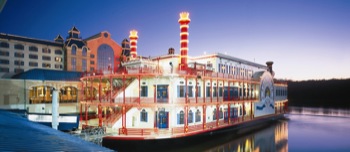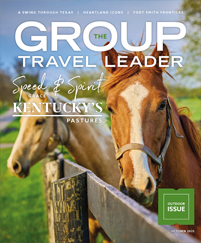 Courtesy Council Bluffs CVB
Courtesy Council Bluffs CVB
When we think of the history of modern casino gambling in the United States, we naturally think of Las Vegas, which began its rise in the 1940s, and Atlantic City, N.J., which brought legal casino gambling to the East Coast in 1978. But don’t forget the unlikely locale right in the middle of the country that came next: Iowa.
“We were the first in the country to establish Las Vegas-style gaming on riverboats. The law was passed in 1989, and the first boats opened their doors in April 1991,” said Wes Ehrecke, president of the Iowa Gaming Association.
Farming roots
Iowa was in the midst of the devastating farm crisis. High farm debt, high interest rates, low farm values and new technology that required fewer people for farm work heightened the crisis. Iowa was hurting.
“There were a lot of job losses,” said Ehrecke. “One T-shirt at the time said ‘Last One Out, Turn Out the Lights.’ Legislators began looking at things that could be a catalyst for economic development, that would generate tourist dollars and generate jobs.”
Visionaries thought they could lure people back to the river, specifically the Mississippi River, on Iowa’s eastern border, and the Missouri River, on the western side of the state. The idea was to allow casinos to be built on paddleboats that would regularly cruise up and down the rivers as visitors ate, drank and, most importantly, gambled on board.
“That’s how the industry was born here,” said Ehrecke.
As years passed, Iowa gaming laws were adjusted. Today, there’s no longer a requirement that casinos cruise nor even that they have water underneath their gaming floors. Although half a dozen riverboats still exist, some remain docked and have hotels and other amenities located next to them.
Numerous land-based casinos opened, some at racetracks. Iowa now has 17 casinos operating in or near population centers such as Council Bluffs, Sioux City, Dubuque and Davenport.
Iowa is no longer an original when it comes to gambling. It competes with its border states, which chase the same discretionary dollars Iowa does. That means that one little snub or a below-average experience might send a tourist or group to another state’s gaming tables and slots.
“You have to give customers what they want, and that means great customer service. The gaming companies have continued to upgrade facilities with additional amenities,” said Ehrecke.
The Ameristar Casino Hotel Council Bluffs caters to visitors by labeling its latest games with signs reading “New Slot” so regulars can easily find new games or “Hot Slot” to designate the most popular games on the floor as determined by customer usage.
With gaming properties, quality counts. The Ameristar Casino Hotel Council Bluffs includes the largest riverboat in Iowa. But this property has also received the prestigious AAA Four Diamond designation. Only 3.4 percent of the 32,000 AAA-rated lodgings earn that label.
“So it’s not just gaming anymore. It’s got to be an entertainment experience that includes concerts, convention and meeting facilities, hotels, spas, salons, golf courses and bowling alleys, comedy clubs and restaurants,” said Ehrecke.
Iowa has an unusual section of its gaming regulations that some call the “eight-year law.” Every eight years, voters in all of the counties in Iowa in which casinos are located can decide whether to continue gaming in their jurisdictions.
In addition, counties that have passed referendum votes but are awaiting approval of their licenses can vote, too. In 2010, 20 Iowa counties were required to have casino votes. In other years, continuation of gambling passed easily in most locations.
Economic impact
“Pottawattamie County’s three casinos — Ameristar, Harrah’s and Horseshoe — are the largest employers and taxpayers in the county, providing more than $8 million each year to support local charities, public services and programs through the Iowa West Foundation,” said Christie Scott, public relations manager for the Ameristar Casino Hotel Council Bluffs. “A yes vote allows the three casinos to stay open and preserves jobs, tax revenues and funding for community programs.”
Iowa’s casinos draw about 55 percent of their business from out-of-state visitors. Ehrecke wants group tour booking agents to know that Iowa has much to offer.
“It’s a beautiful state with many tourism attractions besides casinos. The gaming industry is a viable part of Iowa’s economy and adds value to the state’s tourism industry. Any tour operator would benefit from bringing a group to a casino in Iowa.”
For more gaming:
Gaming keeps on growing
An Iowa platinum milestone
Las Vegas and Atlantic City battle the recession









